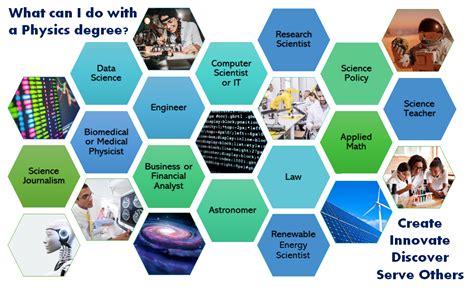Physics is an intriguing field that unlocks the secrets of the universe, equipping graduates with a deep understanding of fundamental principles and analytical skills. With a physics degree, you can open doors to a wide range of rewarding careers in both traditional and emerging fields.

Industries that Embrace Physics Graduates
Graduates with a physics degree are highly sought-after by industries such as:
- Scientific research and development
- Engineering
- Technology
- Aerospace
- Finance
- Education
High-Demand Job Roles for Physics Majors
1. Physicist
Physicists explore the fundamental laws of nature and solve complex problems in areas such as particle physics, condensed matter physics, and astrophysics. According to the U.S. Bureau of Labor Statistics (BLS), physicists earn a median annual salary of $129,890.
2. Engineer
Physics graduates can pursue careers in various engineering disciplines, including electrical engineering, mechanical engineering, and biomedical engineering. The BLS reports that engineers earn a median annual salary of $110,220.
3. Data Scientist
Data scientists analyze vast amounts of data to identify patterns, draw conclusions, and make predictions. Physics graduates’ analytical and problem-solving skills make them well-suited for this role. The BLS estimates that data scientists earn a median annual salary of $126,830.
4. Financial Analyst
Financial analysts use physics-based models and analytical techniques to evaluate investments, assess risk, and make financial projections. The BLS reports that financial analysts earn a median annual salary of $87,370.
5. Software Developer
Software developers apply physics principles to design, develop, and maintain software systems. The BLS states that software developers earn a median annual salary of $110,140.
6. Teacher
Physics graduates can teach physics and related subjects at the high school and university levels. According to the BLS, secondary school teachers earn a median annual salary of $78,100.
Exploring Niche Applications with “Physifycation”
The increasing sophistication of today’s technologies is creating a fertile ground for “physifycation,” where physics principles are ingeniously applied to solve problems in diverse fields. This trend has sparked exciting new job opportunities, including:
- Quantum computing engineer: Designing and optimizing quantum computers that harness the power of quantum mechanics to perform complex calculations.
- Energy harvesting specialist: Developing devices that convert various sources of energy, such as sunlight, heat, or mechanical energy, into electrical energy.
- Medical physicist: Applying physics to improve medical treatments, such as designing diagnostic imaging systems and radiation therapy techniques.
- Climate modeler: Using physics-based models to predict future climate scenarios and assess the impact of human activities on the environment.
Common Mistakes to Avoid
- Underestimating the breadth of opportunities: Do not limit yourself to traditional physics roles. Explore the vast array of industries and job functions that a physics degree can open up.
- Not developing soft skills: While technical skills are essential, enhance your resume by acquiring strong communication, teamwork, and problem-solving abilities.
- Ignoring industry experience: Gain hands-on experience through internships, research projects, or part-time jobs to complement your academic knowledge.
- Neglecting networking: Attend industry events, join professional organizations, and connect with potential employers to build your network and discover hidden job opportunities.
How to Prepare for a Career with a Physics Degree
- Excel in coursework: Maintain a strong academic record, particularly in physics, mathematics, and computer science courses.
- Develop specialized skills: Identify specific subfields in physics that interest you and pursue coursework, projects, or research in those areas.
- Gain practical experience: Engage in research projects, internships, or other hands-on opportunities to apply your physics knowledge to real-world problems.
- Build your network: Attend industry conferences, join professional organizations, and connect with potential employers to expand your professional circle.
- Tailor your resume and cover letter: Highlight your relevant skills and experience, emphasizing how your physics degree has prepared you for the specific role you are applying for.
Table 1: Median Annual Salaries for Physics-Related Jobs
| Job Title | Median Annual Salary |
|---|---|
| Physicist | $129,890 |
| Engineer | $110,220 |
| Data Scientist | $126,830 |
| Financial Analyst | $87,370 |
| Software Developer | $110,140 |
| Secondary School Teacher | $78,100 |
Table 2: Physics Degree Programs and Corresponding Career Options
| Degree Program | Career Options |
|---|---|
| Bachelor’s Degree | Physicist, Engineer, Data Scientist, Financial Analyst, Software Developer |
| Master’s Degree | Research Scientist, College Professor, Consultant |
| Ph.D. | Research Scientist, University Professor, Chief Scientist |
Table 3: Skills Acquired Through Physics Education
| Skill | Description |
|---|---|
| Analytical thinking | Problem-solving, data analysis, and critical thinking |
| Mathematical modeling | Developing and applying mathematical models to solve real-world problems |
| Experimental design | Designing and conducting experiments to test hypotheses |
| Computational skills | Programming, simulations, and data analysis |
| Communication skills | Effectively conveying scientific concepts and findings |
Table 4: Industries That Hire Physics Graduates
| Industry | Job Functions |
|---|---|
| Scientific research and development | Physicist, Research Scientist |
| Engineering | Electrical Engineer, Mechanical Engineer, Biomedical Engineer |
| Technology | Data Scientist, Software Developer, Web Developer |
| Aerospace | Aerospace Engineer, Physicist, Mission Control Specialist |
| Finance | Financial Analyst, Risk Analyst, Investment Analyst |
| Education | High School Physics Teacher, University Professor |
| Healthcare | Medical Physicist, Health Physicist, Radiation Therapist |
Conclusion
A physics degree offers a gateway to a universe of exciting and rewarding career possibilities. With its emphasis on fundamental principles, problem-solving, and analytical skills, physics graduates are well-equipped to make significant contributions in a wide range of industries. By embracing “physifycation” and developing a diverse skillset, you can unlock countless opportunities in the ever-evolving world of science, technology, and beyond.
